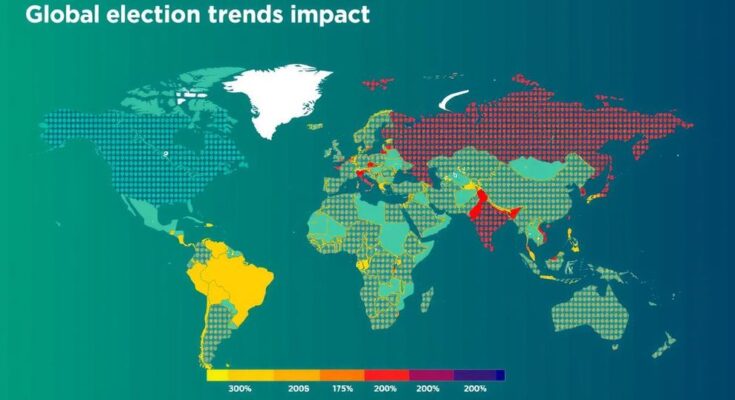In a pivotal election year marked by rising populism and climate skepticism, global commitments to tackle the climate crisis appear to be waning. Notable electoral victories for climate-denying leaders alongside increasing climate-related disasters indicate a troubling disconnect. Despite some progress in renewable energy, the overarching narrative reflects a troubling shift in prioritization away from climate action toward immediate economic concerns. As the Cop29 climate summit underscores, the future remains uncertain amid these developments.
The global commitment to combating the climate crisis appears to be diminishing despite an unprecedented number of elections worldwide in 2024, which has been dubbed the “biggest election year in human history” by the United Nations. Notable electoral victories for leaders with climate-skeptic views, such as Donald Trump in the United States and far-right parties in Europe, signal a troubling trend where the climate agenda has lost momentum. Experts indicate that while climate-related disasters are escalating, public prioritization of climate action has been overshadowed by pressing issues like inflation and political instability.
The past year has revealed a complex intertwining of political and environmental issues. Many governments that previously championed climate action have shifted focus amidst global crises, such as the pandemic and conflicts in Ukraine and Gaza. As Catherine Fieschi, an expert in European politics, noted, “It’s been a bad year for climate and we’ve seen a gradual erosion in the public’s commitment to action for a couple of years now.”
The climate crisis has largely remained a secondary concern during elections, despite alarming scientific warnings about rising temperatures and extreme weather events. Although certain regions, such as India, experienced significant climate-related activism influencing elections, right-wing parties in Europe and the U.S. have successfully portrayed climate action as a threat to economic stability.
Interestingly, there have been exceptions, such as the UK’s Labour Party, which advocated for clean energy and gained traction. However, the overall landscape points to a weakening resolve to address climate change, raising concerns about the potential consequences as global emissions continue to rise.
The recent Cop29 climate summit, largely attended by leaders offering minimal commitments, epitomizes the current state of international climate negotiations. Activists and leaders alike have expressed frustration over the lack of progress in curbing emissions. Gerry Arances, executive director of the Center for Energy, Ecology and Development, remarked on the heightened anxiety surrounding the U.S. elections potentially undermining global climate action, stating, “apparently, the halls of Cop29 are already flooded with many Trumps.”
In conclusion, while there are strides in renewable energy development, the mounting delays and the looming prospects of leadership changes dampen hopes for effective climate action. As the world increasingly grapples with climate-related challenges, each day without decisive action compounds the urgency to reverse this disturbing trend. Despite some advancements, the ongoing political dialogue risks relegating climate action to the back burner, with significant implications for global efforts against climate change.
The article examines the intersection of global politics and climate action amid an election year characterized by significant political changes, particularly with the rise of climate-skeptic leaders. The analysis reflects on how various crises have shifted public focus away from climate issues towards immediate economic and social concerns, even as climate-related disasters intensify worldwide. Insights from political experts provide a framework for understanding this phenomenon, as they highlight the erosion in public support for climate initiatives in favor of worrying about inflation and populist governance. The backdrop of the 2024 elections and their implications for future climate negotiations underscore the challenges facing global commitments to sustainable practices.
The examination of the 2024 election year reveals a concerning trend of diminishing dedication to climate action, as evidenced by the electoral success of leaders who downplay the climate crisis. Although the year has witnessed a surge in climate-related disasters, political priorities have shifted towards immediate economic concerns, allowing the climate agenda to falter. As the Cop29 summit illustrates, global leaders are struggling to align on effective climate strategies amidst rising skepticism. The perilous trajectory of climate action necessitates urgent reevaluation to avert catastrophic outcomes.
Original Source: www.theguardian.com




